Local governments are weighing the benefits of spending money to fix or replace sirens made ineffective by wear, age or vandalism versus moving to newer systems such as reverse 911 telephone systems, weather radios and text messaging.
When a tornado tore through downtown Jackson, Miss., April 4, it hit residents in the Northgate subdivision hard and without warning. No one was injured, but city officials discovered during the massive clean-up that the siren in the neighborhood did not work. Thieves apparently had disconnected it to steal the copper wiring and connectors, said Larry Fisher, Hinds County emergency management director.
Fisher said one out of every four emergency sirens in the county does not work. Weather, vandals, and normal wear have taken their toll on sirens, some of which date back to the 1950s, he said.
Maintaining an aging and at times unreliable network of sirens is a problem for communities in storm-prone areas nationwide.
• In Longview, Texas, at least two sirens of the city's 20 sirens did not go off during a March 18 tornado, even though the city has spent $300,000 over the past five years upgrading the system, Mayor Jay Dean said.
•In Topeka, Shawnee County Emergency Management Director Dave Sterbenz said residents reported that nearly a dozen sirens failed to sound during a May 2 tornado. Sterbenz said most actually sounded; but couldn't be heard inside houses.
• Franklin County, Ohio, which includes Columbus, spent more than $279,000 to fix its siren system after three-quarters of the system was damaged during a test last August, interim Emergency Management Director Jim Leonard said.
•The sole siren in tiny Keo, Ark., was not working when a tornado hit May 2. Mayor Nancy Tardy said firefighters drove fire trucks, sirens wailing, around the city of 235. Tardy said Keo has purchased a used siren for $8,000.
The Warning Alert and Response Network Act, which was signed into law in 2006, calls for a nationwide system of alerts for dangerous weather and other hazards distributed by text message. Although voluntary, the nation's major wireless carriers have agreed to participate, and last month the Federal Communication Commission approved guidelines that could put the system in place by 2010.
In testimony earlier this month before the House Homeland Security Committee, Federal Emergency Management Agency Assistant Administrator Martha Rainville touted what she called the "nation's next generation alert system" which will use telephones, cellphones, websites and e-mails to deliver alerts across multiple media. Dean said residents in his city of 76,000 still want the sirens, but he thinks the are too ineffective to stand alone. "We have about 75 to 80% go off when they are supposed to, " he said.
Longview is adding a reverse 911 system that calls residents when a tornado warning is issued for their area. Dean said the telephone solution is more dependable than the sirens.
"At 1:15 in the morning, had that siren been going off in my area, I wouldn't have heard it," he said. "People are going to pick that phone up, especially in the dead of night."
Joyner reports for The Clarion-Ledger in Jackson, Miss.
WEATHER NOTE
Local Camps Prepared For Severe Weather
By Gina Ford
Locally, one summer camp is taking precautions to ensure the safety of its children this tornado season.
It was a disastrous evening for Midwesterners as a tornado swept across the plains, killing two people in Chapman and Soldier, Kansas.
In Iowa, four boy scouts were killed and 48 others injured as another tornado passed through their campgrounds. The tornado flattened tents and structures at their isolated Western Iowa campgrounds. And now the potential for sever weather has many tornado alley residents shaken up.
But at Camp Kearney, they say they take extra precautionary measures to ensure the safety of all their campers.
Camp Kearney is a summer camp for low-income city and rural children.
Camp Director John Theien says they have a plan if severe weather hits Fulton County.
"Well it all starts with our training with our staff. Being aware of our grounds and where protection is."
He says there are camp counselors that constantly watch all 65 children who are at the summer camp.
Counselor Emily Gerber says she is on constant alert in case she has to get her girls to shelter.
She said, "We listen to radios, we are allowed radios in our cabins, so I usually have mine going to weather."
If a tornado warning takes effect, they rush all of the kids to the bathhouse, a windowless area surrounded by concrete walls.
They also sound a bell to let everyone know that it is an urgent situation.
Theien says he has worked with camps for 15 years, and he is confident that he and his counselors will keep their campers safe in the event of severe weather.
MARITIME NOTE
A Note On Roz Savage
While both Captain Konrad and myself understand the drive to challenge the sea and undertake a voyage such as the one Roz Savage has. I listened with sadness to Savage's podcast taking note of Captain John Konrad and myself. Ms. Savage while taking one of the ultimate challenges in any ones life...the sea. Seems to be not just attempting to row across the Pacific, but spin herself across the Pacific.
Ms. Savage is noted as saying that neither Captain Konrad nor I understand the expert team she has in place. Well if that is the case then my mother is a ULCC. Ms. Savage, both Captain Konrad and myself know exactly the make up of this so-called expert team.
What ever team (sic) Ms. Savage has in place is not a structured team at all and very loosely assembled. I do not want to take anything away from anyone associated with Ms. Savage, with exception of Mr. Shema. I am sure all associated are proficient to some degree. Whether they really know what is going on is another story. I can tell you all this much. If there is an expert team in place Ms. Savage's main sponsor who has provided her with over $200,000.00 + does not know about it either. So let's stop kidding everyone here.
We also note that someone asked a question about why Ms. Savage did not have a chase boat? Her answer? She could not afford one. That to is really not the truth. The truth is that both she and Rick Shema her weather guy, believe that having a chase boat would be a "Green Political Problem". Meaning that it would not look so good if a power craft came along side to assist her because Savage is rowing "Green" to save the environment. Green? Like the carbon footprint she is rowing in is all "Green"!
While the fact is that she never asked her sponsor for a chase boat and this so-called expert team never did either. The same applied to cutting her tangled anchor sea in heavy seas. She refused because that too would be considered polluting the ocean. I guess potentially sinking that carbon footprint "row boat" and loosing ones life is not a form of pollution at sea.?
Two week's ago, Ms. Savage while stranded some 160nm off of Point Conception, California in sea states of 8 and 9, asked Captain Konrad to obtain a rib boat and come out and assist her in retrieving her tangled sea anchor and resupply her with emergency drinking water as well as some gourmet foods. So much for telling the truth about chase boats.
Captain Konrad was not about to risk his life by taking a rib boat out 160nm in those types of sea states. Matter of fact, after inquiring about other supply and fishing boats that were large enough to undertake that type of trip, of which Ms. Savage's main sponsor was willing to absorb the costs for such a craft, none were willing to undertake the trip because of the weather. That is really how bad it was out there.
In my opinion and after a great deal of involvement with Ms. Savage, the USCG and her main sponsor. it is my belief that this ill-planned voyage has very little to do with focusing on pollution at sea and is nothing more than a elaborate public relations stunt for fame and glory.
Savage has an epiphany
To update the bog today regarding Ms. Savage and her "light bulb moment" idea on how to retrieve her tangled sea anchor. She writes in her blog of last night......
"This morning, as I was waking up, an idea came to me. The problem with the sea anchor was that although I could pull it in a certain distance, the next time a big wave came along it would yank the line out of my hands and I would lose the progress I had made. What I needed was a cleat that would allow me to wind the line around it, taking the strain off my hands and bringing the line in little by little. But I had no suitable cleats in the cockpit."
Brainstorm? It is sad, this was her idea? Try again Ms. Savage. This fix was what both Captain Konrad and myself explained to you over a week ago. But then again as you tell everyone, you have a expert team in place and no one on this team could find a solution? .......Just sad....
Executive Interview with US Coast Guard ADM Thad Allen
This week's archived print article features an exclusive executive interview with U.S. Coast Guard Commandant Thad Allen. First published in our April 2008 Maritime Executive edition, the article outlines the way forward for the Coast Guard and also looks back at the past.
In this week's archive piece, U.S. Coast Guard Commandant ADM Thad Allen has pledged to modernize a Coast Guard that, in his own words, "has not kept pace" with the demands placed upon it in the post-9/11 regulatory world. Selling that message to Congress will be the linchpin of how successful his effort will be. The full amount of the President's FY '09 Coast Guard budget request hangs in the balance.
Allen has done a lot of selling in the past six months. More accessible to industry and on the move more often than any of his predecessors, he also spends a large amount of his time on Capitol Hill. Because he constantly meets with industry stakeholders, getting him to slow down long enough to take his temperature on the full range of his responsibilities is usually next to impossible.
In mid-February, Managing Editor Joseph Keefe was privileged to get two hours of Allen's undivided attention as he flew to Houston for an industry function. The details of this exclusive interview, providing direct and unvarnished dialogue that Allen willingly delivers, cannot be read or seen anywhere else. Follow along as ADM Thad Allen explains what he means by "Honoring the past, not operating in it."
Normally, this article can only be read by subscribing to the print edition THE MARITIME EXECUTIVE. Our print vehicle is the most comprehensive business journal, written for and about maritime executives. Click HERE to read the article.
Redefining Liability: Who's Really to Blame in the COSCO BUSAN Case?
The owner of the COSCO BUSAN, the ill-fated vessel that allided with the San Francisco Bay Bridge, has finally come out swinging against those who would blame the operator for a major San Francisco Bay oil spill last year. Alleging negligence and misconduct by the U.S. government because the ship's pilot was granted a license despite a history of drug and alcohol abuse, the response of Hong Kong-based Regal Stone directly contradicts a lawsuit filed earlier by the Justice Department which claims the owner and the pilot of the COSCO BUSAN broke environmental laws when the ship struck a bridge support and spilled 53,000 gallons of oil in the bay. It may be years – in fact, decades – before this one is settled.
The counterclaim probably has some merit. A vessel's owner should have a reasonable expectation that competent service will be provided when its vessels arrive at strange ports. These ports, at least here in the United States, typically stipulate compulsory pilotage for registered traffic. The goal? To ensure a safe and environmentally transit of the vessel through waters that can include sharp turns, mysterious currents and shallow waters (insufficient draft) where you least expect it. In the case of the COSCO BUSAN, many have already made up their minds that – for one reason or another – the ship did not get what it paid for.
Notwithstanding the National Transportation Safety Board's recent, callous and casual disclosures of the most intimate details of pilot John Cota's life, the counterclaim alleges that the pilot was medically unfit and incompetent to perform the duties required by his United States Coast Guard license. If the ship owner can demonstrate this accusation to the satisfaction of judge or jury, then they also may be on their way to getting off the hook. The irony of this situation may rest in the fact that the NTSB has already done most of the hard work that will be necessary to do just that.
Marine pilots typically make a lot of money, commanding salaries that put them in the same league as top surgeons and successful attorneys. And, it is a difficult job; one that puts the fate of hundreds of millions of dollars of cargo and similar priced ships in the hands of one individual. That person is also tasked with ensuring the safety of those ashore and the protection of the environment, as well. And so, if they are burdened with those responsibilities, then they should be adequately compensated for the job. By the same token, that pilot has heavy liabilities if something goes wrong. The age-old tenet of a pilot being merely an advisor to the Master is all but gone. Unfortunately, that tradition may also be all the government has left to argue its position, in the wake of this week's counterclaim by the ship owner.
In Boston, Massachusetts – at this very minute – the state legislature is actually contemplating the licensing of docking masters who operate under specific conditions of employment (and want to continue that situation) as laid out HERE. And, while most of us would think it extremely unlikely that pilots will escape liability for errors in the future, the terms and conditions that you just read in the clickable link could become standard operating procedure in Massachusetts, and soon. Just imagine the basis for a future lawsuit in the Bay State when a maritime incident occurs and the pilot – mandated by law – cannot be held liable for anything.
Meanwhile, back in San Francisco, Cota has pleaded not guilty and a trial date has not been set. The Justice Department is predictably not saying much and supposedly has until early August to respond to the counterclaim. Pilots, regulatory personnel, federal and state governments everywhere are watching closely; and with good reason. There's only one thing that is very clear in all of this: there's plenty of blame to go around for everyone. And, when the fog finally lifts, I doubt there will be anyone – pilots, ship's operators or crew, regulators and governments alike, that will be happy with the final result. Somebody once told me that the mark of a good deal is one which leaves all parties somewhat unsatisfied. I'm betting that in the case of the COSCO BUSAN, this adage will hold especially true. - MarEx
FREAK WAVES PART V
WEEKEND PODCAST ENJOYMENT
Have a great weekend!
RS









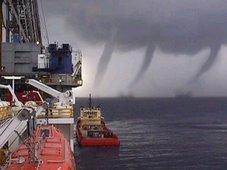
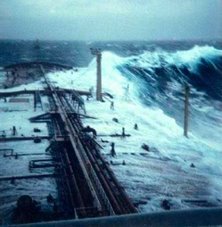
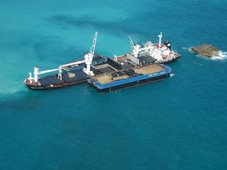
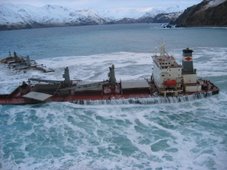
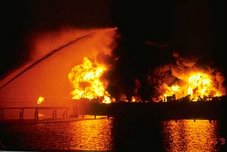
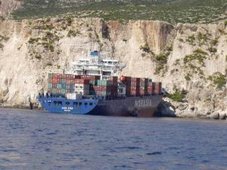


![Validate my RSS feed [Valid RSS]](valid-rss.png)
No comments:
Post a Comment